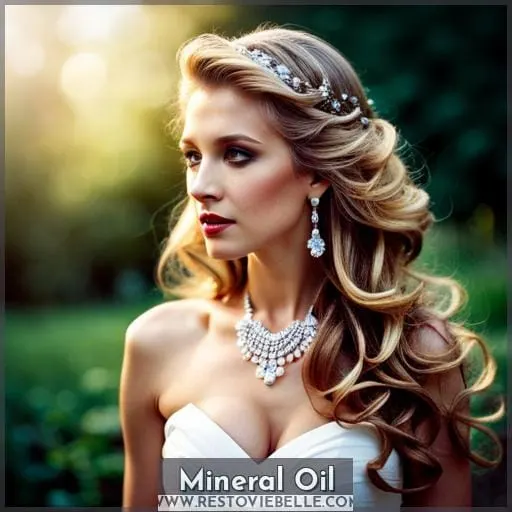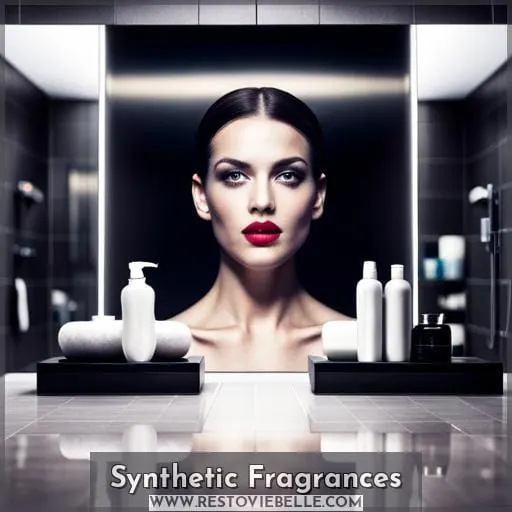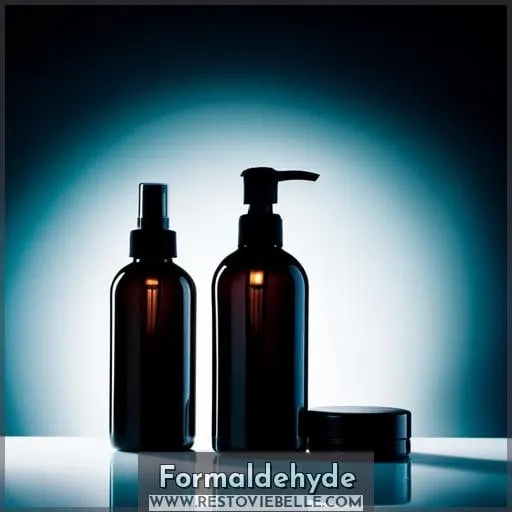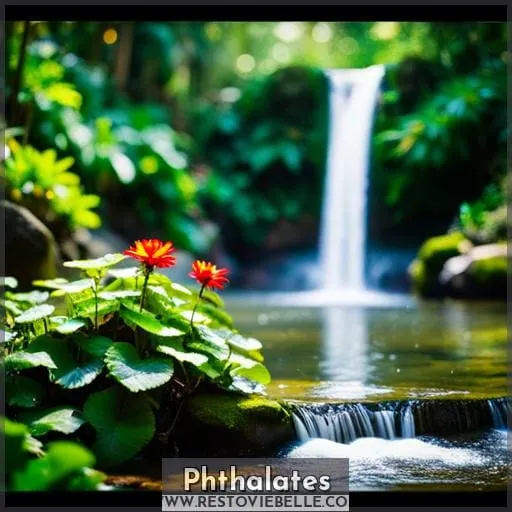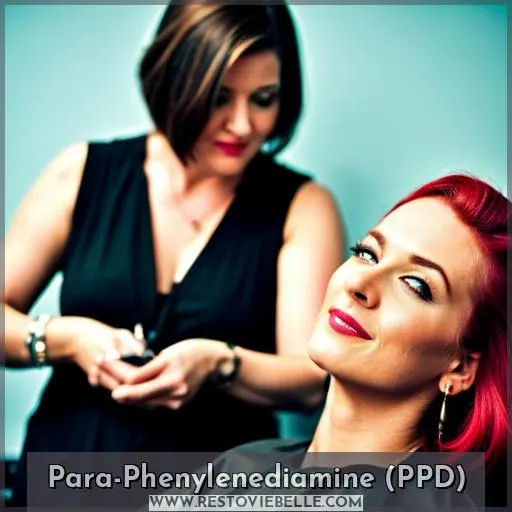This site is supported by our readers. We may earn a commission, at no cost to you, if you purchase through links.
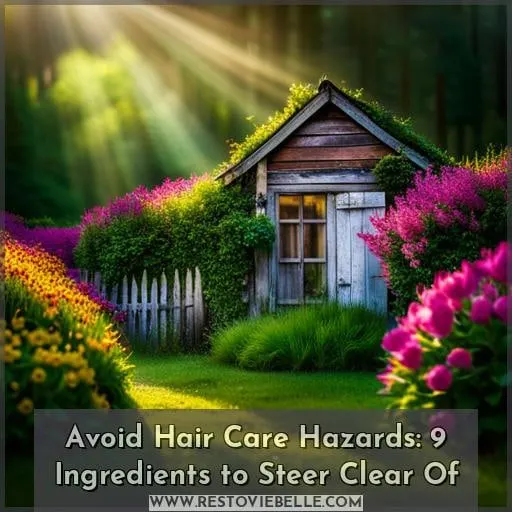 As the adage goes, knowledge is power. When it comes to hair care, knowledge about harmful ingredients can be especially powerful in keeping you and your locks safe from harm.
As the adage goes, knowledge is power. When it comes to hair care, knowledge about harmful ingredients can be especially powerful in keeping you and your locks safe from harm.
To help keep your tresses healthy and looking their best, read on for a comprehensive list of nine ingredients to avoid when shopping for shampoo or conditioner:
- Sulfates
- Mineral oil
- Parabens
- Denatured alcohols
- Synthetic fragrances
- Formaldehyde
- Coal tar
- Silicones
- Phthalates
- Para-phenylenediamine (PPD)
Armed with this information, you’ll know exactly what not to buy next time you hit the beauty aisle!
Table Of Contents
- Key Takeaways
- Sulfates
- Mineral Oil
- Parabens
- Denatured Alcohols
- Synthetic Fragrances
- Formaldehyde
- Coal Tar
- Silicones
- Phthalates
- Para-Phenylenediamine (PPD)
- Frequently Asked Questions (FAQs)
- What type of hair care is best for my specific hair type?
- What are the long-term effects of using certain ingredients?
- How often should I use hair care products with these ingredients?
- Are there any natural alternatives to these ingredients?
- How can I find out if a hair care product contains these ingredients?
- Conclusion
Key Takeaways
- Sulfates, parabens, formaldehyde, coal tar, silicones, phthalates, PPD dyes are harmful chemicals to avoid in hair care.
- Seek natural alternatives such as natural oils, aloe vera, honey, and plant oils and extracts.
- Read labels thoroughly to check for harmful chemicals and unknown ingredients. Look at INCI labels to identify all ingredients.
- Consult experts and do research to understand your specific hair needs and seek professional guidance.
Sulfates
You should steer clear of sulfates as they can strip away natural oils, disrupt hormones, and irritate skin. Sulfates are found in many shampoos and other hair care products, but their use is not recommended due to the health risks associated with them.
UV exposure from the sun or tanning bed also damages your hair by breaking down proteins that make up its structure. Parabens have been linked to hormone disruption, while selenium sulfide has potential carcinogenic effects when exposed over long periods of time.
Denatured alcohols, such as isopropyl alcohol, can dry out your scalp, leaving it vulnerable to irritation or infection.
Coal tar dyes contain toxins that may cause serious problems like cancer if used repeatedly without proper protection for your scalp’s health. When choosing a product for daily use, it is important to consider all these factors before using one containing any of these ingredients mentioned above, which could prove dangerous in the long run, even if you don’t notice immediate side-effects.
Natural remedies, such as coconut oil, honey, aloe vera, etc., provide an alternative option worth exploring instead of relying on harsh chemicals present in some store-bought products.
Mineral Oil
Mineral oil can clog your pores, leaving you feeling weighed down and unable to breathe. Like a balloon that’s been filled with too much air, it restricts the natural flow of nutrients into your hair.
Despite its moisturizing benefits, mineral oil has been linked to numerous harmful effects on our health and environment due to its petrochemical properties. It could potentially disrupt hormones in both men and women, as well as increase cancer risk when used for prolonged periods of time over large areas of skin or scalp.
To reduce these risks associated with mineral oils, it is best practice to seek out natural alternatives such as coconut oil. Coconut oil offers many nourishing benefits without any harsh chemicals or toxins found in traditional products like sulfates, parabens, phthalates, or formaldehyde.
When shopping for organic ingredients, be sure they are certified by an accredited body. This way, you know what you’re buying is safe from contaminants while still providing effective results. Look for product recommendations from professionals, such as Genesis, who specialize in quality care and training using only the safest ingredients possible.
Take safety measures seriously when choosing haircare items – don’t take chances!
Parabens
Making the switch to natural hair care products can be a great way to improve your overall health. However, it’s important to know what ingredients you should look out for in order to ensure that the product is right for you.
Parabens are one of those often overlooked but potentially dangerous ingredients found in many conditioners and other hair care products. These preservatives have been linked with skin irritation and hormone disruption, so avoiding them where possible is key when choosing which items best suit your needs.
It’s easy enough too; just check the INCI labels on all of your potential purchases before making any decision!
Additionally, keep an eye out for fragrances or dyes as these often contain synthetic versions with undisclosed toxins – so if either are present on the label, it may be wise not to opt for this product over something more natural like essential oils or aloe vera instead.
Finally, while mineral oil can provide some short-term relief from dryness due to its coating properties, ultimately it blocks moisture leading to long-term build-up and further damage – so seeking professional help rather than relying solely upon DIY solutions may help avoid these issues entirely!
Denatured Alcohols
Avoiding denatured alcohols in your hair care routine can help reduce skin irritation, dryness, and the risk of hormone disruption by up to 50%. Denatured alcohol is a toxic ingredient that strips moisture from the scalp and strands, leaving them vulnerable to damage.
It’s also known as an endocrine disruptor, which can lead to health issues such as infertility or cancer.
Instead of using these harsh chemicals, opt for natural ingredients like essential oils or plant-based oils, such as coconut oil.
For those looking for cruelty-free products with no harmful ingredients, look out for brands that focus on natural solutions rather than synthetic ones full of silicones or other toxins.
Synthetic Fragrances
Synthetic fragrances can disrupt hormones and irritate skin, so consider steering clear of them in your hair care routine. Fragrance chemicals like polyethylene glycols are often found in soap, shampoo, and conditioner, as well as other products.
While they add a pleasant scent to the product, they can also be irritating to your scalp or even cause allergic reactions.
Additionally, many synthetic colors used to give cosmetics their vibrant hues contain retinyl palmitate, which has been linked with an increased cancer risk. To avoid these unwanted side effects, opt for natural oils such as coconut oil, jojoba oil, argan oil, or marula oil instead.
Aloe vera is great for hydrating dry strands, while honey is known for its healing qualities. Essential oils offer antiseptic powers against bacteria, while chamomile helps reduce irritation.
Ultimately, it’s best not only to pick products without any synthetic fragrances but also to check all labels thoroughly before buying anything! With quality care from professionals combined with natural ingredients, you’ll have everything you need to get healthy, happy hair – no harsh chemicals required!
Formaldehyde
You should steer clear of formaldehyde, which is a potent irritant and can be as dangerous as dynamite for your hair. It’s found in many products like nail polish, hairspray, shampoo, and other colors used for coloring or highlighting.
Formaldehyde has been linked to numerous health risks, including respiratory issues, immune system problems, and even cancer development over time.
Here are some key points on avoiding this harmful chemical:
- Harmful Effects: Long-term exposure can lead to serious health complications, such as tumors or cancer risks related to breathing it in over long periods of time.
- Risk Factors: Prolonged exposure through inhalation during application increases the risk of chronic illnesses from its effects.
- Prevention Tips: Avoiding direct contact with the skin while applying products containing formaldehyde will reduce potential toxicity.
- Natural Alternatives: Seek out natural ingredients like essential oils, aloe vera, honey, and chamomile suggested by hair care experts that nourish without unwanted side effects.
Coal Tar
Coal tar is a chemical byproduct of burning coal and should be avoided in your hair care, as it can cause skin irritation. It’s found in many products used to add color or texture such as dyes, shampoos, and styling gels.
To ensure you’re using the safest possible ingredients for your hair health, it’s important to look for natural colorants like plant-based oils and essential oils instead of coal tar derivatives when choosing colors or treatments.
Additionally, opt for sulfate-free formulas that are vegan-friendly with no added sulfates; these are gentler on the scalp than conventional formulas containing coal tar derivatives.
Also, try avoiding quaternium salts which sometimes contain coal tar remnants too. While they help conditioner stay longer on the strands, they can also leave unwanted buildup over time, leading to dryness and damage.
Instead, use silicone-free products with beneficial ingredients like argan oil and vitamin B5, which will naturally nourish without leaving behind any residue.
So skip out on anything containing coal tar – go natural!
Silicones
Avoid silicones in your hair care products, as they can build up on the scalp and block moisture. Scientists have found that over 80% of beauty and personal care products contain at least one silicone-based ingredient.
Silicones are often used to give a product its texture and shine, but the downside is that they tend to lock out moisture from the hair shaft, making it difficult for natural oils to reach your scalp.
They also create an oil-free barrier on top of skin cells, which can cause unregulated cellular reproduction leading to damage or even cancer if exposed long enough. Additionally, synthetic fragrances present in many silicone-based products may be toxic when absorbed by the skin or inhaled directly, causing further irritation of sensitive scalps and resulting in dryness and brittle hair strands.
To ensure safety, opt for non-toxic, natural-based options free from silicones whenever possible, so you don’t risk damaging both your health and locks!
Phthalates
The effects of phthalates on hair care should not be taken lightly. Phthalates are a group of chemicals that can have harmful effects when used in products, and they can carry health risks as well.
Fortunately, there are natural alternatives to traditional chemical-laden products like phthalates. Plant oils, such as coconut, jojoba, argan, and marula oil, provide nourishment to the hair without stripping away its natural oils or causing irritation or dryness.
Additionally, mild surfactants derived from plant ingredients like aloe vera leaf extract offer gentle cleansing solutions for your scalp and strands while avoiding harsh chemicals found in synthetic fragrances or dyes that could potentially cause skin reactions or hormone disruption.
It’s important to read labels carefully before making a purchase decision as regulatory bodies do not always require full disclosure of all ingredients included in the product – meaning you may never know what you’re putting on your head until it’s too late! INCI (International Nomenclature Cosmetic Ingredient) labeling is one way consumers can get an idea of what exactly is inside their shampoo bottle by deciphering each ingredient listed according to standardized nomenclature conventions set forth internationally.
However, this process requires commitment, which many shoppers would rather avoid due diligence altogether. So it’s best practice for them to seek out professionals who understand how these formulas work together safely before engaging with DIY techniques involving harsh chemicals.
Para-Phenylenediamine (PPD)
Be wary of Para-Phenylenediamine (PPD) as it can dry out and damage your luscious locks, leading to long-term hair loss. PPD is a common ingredient in many dyes, bleaches, and other chemical treatments used for coloring or straightening hair.
Unfortunately, some people may be more sensitive than others when exposed to the chemical. This means that even if you don’t have an initial reaction, there could still be potential risks involved with using products containing this particular compound.
In light of these facts, it’s important that you educate yourself on natural alternatives available at salons like Genesis.
Always check INCI labels thoroughly before buying any product so you know exactly what’s in them.
Frequently Asked Questions (FAQs)
What type of hair care is best for my specific hair type?
Discovering the best hair care for your specific hair type requires research and understanding. Suspense builds as you explore options, seeking natural ingredients to nourish locks while avoiding harsh chemicals that strip oils, irritate the skin, or disrupt hormones.
What are the long-term effects of using certain ingredients?
The long-term effects of using certain ingredients can be dramatic: dryness, hormone disruption, and even an increased risk of cancer. Visualize nourishing your hair with natural alternatives like coconut oil and honey for lasting protection.
Make sure to carefully check all labels before making a purchase, and then seek professional help to find the best routine that will keep your hair healthy in the long run.
How often should I use hair care products with these ingredients?
Avoid using hair care products with these ingredients as much as possible. Seek out natural alternatives that nourish your hair and do not disrupt hormones or increase the risk of cancer. Thoroughly check INCI labels for all ingredients before making a purchase to ensure the quality and safety of use.
Are there any natural alternatives to these ingredients?
Absolutely! There are natural alternatives like plant oils, essential oils, and aloe vera. These nourish the hair naturally and won’t disrupt hormones or cause skin irritation.
How can I find out if a hair care product contains these ingredients?
To find out if a hair care product contains these ingredients, thoroughly read the INCI label. Avoid synthetic fragrances and dyes as they may contain toxins or undisclosed chemicals. Instead, look for natural ingredients like essential oils, aloe vera, honey, and chamomile, rather than harsh chemicals.
Conclusion
When it comes to hair care, it’s important to choose wisely. Just like a chef has to carefully select ingredients to make a delightful dish, you have to be equally selective when it comes to your hair products.
To ensure your hair is healthy and looks its best, it’s important to avoid ingredients like sulfates, mineral oil, parabens, denatured alcohols, synthetic fragrances, formaldehyde, coal tar, silicones, and phthalates.
Not only are these ingredients harsh on the hair, but they can also cause skin irritation and dryness, disrupt hormones, and even increase your risk of cancer.
The best way to protect your hair is to opt for natural ingredients like plant oils, essential oils, aloe vera, honey, and chamomile. Before buying any product, be sure to thoroughly check its INCI label for all the ingredients.
If all else fails, it’s best to seek out a professional like Genesis for quality hair care and training. Don’t take chances with your hair, make sure you know what you’re putting on it.

